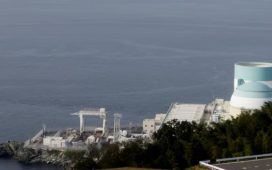When the UK, the US and Australia announced the details of their multibillion-dollar deal to provide Australia with nuclear-powered submarines on Monday, the reaction in China was both outrage and confusion.
The allies were “walking further and further down the path of error and danger”, said Wang Wenbin, China’s foreign ministry spokesperson, on Tuesday. The Chinese mission to the UN accused the three countries of fuelling an arms race.
The deal, which will provide Australia with at least three nuclear-powered submarines, is designed to counter what is regarded as a rising threat from China in the Indo-Pacific.
China’s navy already has six nuclear-powered submarines that can fire torpedoes and cruise missiles, according to Nuclear Threat Initiative, a US non-profit organisation. But Chinese state media has accused the Aukus partners of “pure deception” regarding the nuclear non-proliferation treaty (NPT), because the deal involves the transfer of nuclear technology to Australia, a non-nuclear state.
The deal relies on a loophole in the NPT, which allows for fissile material used for non-explosive military use to be exempt from monitoring by the International Atomic Energy Agency (IAEA).
“If Pakistan transferred [nuclear technology] to another country that would be condemned,” says Wang Huiyao, the president of the Center for China and Globalization (CCG), a thinktank in Beijing. “So I don’t know why on this one we’re not hearing much international criticism”.
The IAEA has said Australia, the US and UK informed it of the deal, but reiterated that the “legal obligations” of the three countries to non-proliferation were “paramount”. “Ultimately, the [IAEA] must ensure that no proliferation risks will emanate from this project,” it said.
Australian navy personnel will visit UK and US bases this year to learn how to use nuclear-powered submarines, which can operate further and faster than diesel models and carry out long-range missile strikes. Australia will also work with the UK to develop a new fleet of nuclear-powered subs, which will be known as SSN-Aukus.
Aukus is part of a wider movement of western countries and their allies to secure the Indo-Pacific against what they regard as threats from China.
This week the UK published a refresh of its defence and foreign policy, which said that “China poses an epoch-defining challenge to the type of international order we want to see, both in terms of security and values”. The government says it wants to beef up its national security protections against China, while also pursuing an Indo-Pacific “tilt” to increase the UK’s presence in the region. It follows the publication of the Biden administration’s Indo-Pacific strategy last year, which said the US wanted to strengthen its position in the region in response to “coercion and aggression” from China.
There is also “the Quad”, an alliance between the US, Japan, India and Australia, which aims to build a bulwark against China’s military assertiveness in the region. While there is no mutual security pact, China has complained it amounts to an “Asian Nato”.
after newsletter promotion
These alliances increase China’s perception that it is surrounded by hostile neighbours. In 2022 Zhu Feng and Ni Guihua, of Nanjing University, wrote that Aukus was “an important sign that the United States views the Asia-Pacific region as the core region for the ‘new cold war’ with China”. Beijing has repeatedly accused the west of engaging in a “cold war mentality” and Xi Jinping, the Chinese president, has accused the US of “containment” to slow China’s rise.
China’s amphibious weaponry is of particular concern to its neighbours as this would be key to an assault on Taiwan, an eventuality the US is increasingly concerned about.
In April the US and the Philippines will hold their largest joint military drills in the South China Sea, amid what Manila calls China’s “aggressive” actions there.
But Beijing says it is trying to build stability. Some analysts in China believe the Aukus deal will push the region closer to conflict. “If you only have a hammer, the world looks like it’s full of nails,” said Andy Mok, a senior research fellow at the CCG.













